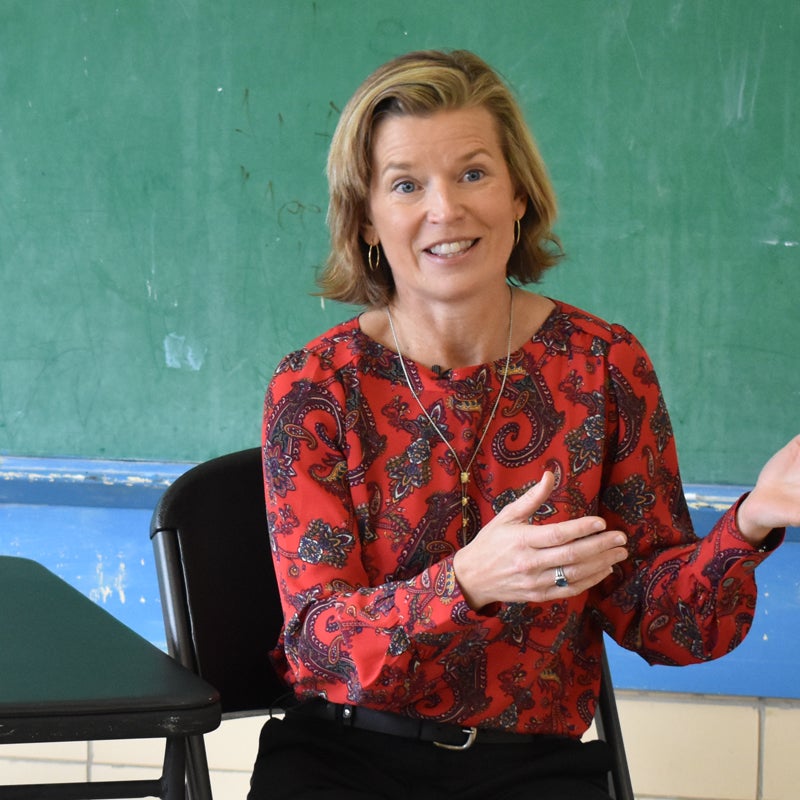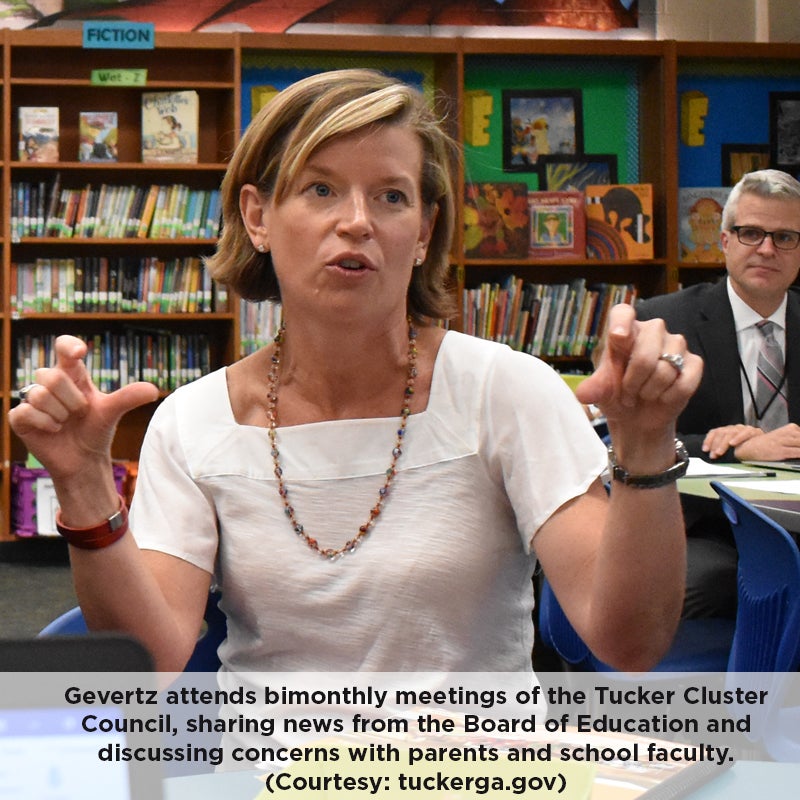InTucker Magazine
February 2020
State of Education
One-on-One with Tucker’s School Board Rep

Allyson Gevertz is one of seven elected representatives on the DeKalb County Board of Education. Elected in 2018 to represent DeKalb’s District 4, Gevertz represents an area that includes the Tucker Cluster. The longtime education advocate sat down with InTucker last month to talk about her path to serving on the Board, as well as her long-term priorities and the highly anticipated hiring of a new school superintendent.
InTucker: How has the transition been going from a volunteer involved in education to an elected representative whose job is education?
Allyson Gevertz: It’s been a very steep learning curve. I attended Board of Education meetings off and on [for] probably 10 years. So, I did have a decent feel for what happens at board meetings, what they talk about, what’s important, what the priorities are [and the] strategic plan and all of that.
What I did not know was everything that goes on behind the scenes that we don’t see as just public observers. So, it’s been quite a learning experience this first year, but I do feel like I have a better grasp the second year. It took a year to sort of feel like I got my legs under me and now I think I’m going to be okay.
InTucker: How many emails do you get from constituents?
AG: That’s the thing…it varies dramatically. So there will be weeks that go by where, I probably get no calls and maybe just get a handful…two-to-five emails on something. Then when something like redistricting happens, I mean, there could be one day where [there] might be 30-50 in a day. So, it just varies. There’s really no rhyme or reason to it than just what the hot topics are.
InTucker: What kind of background makes someone a successful school board member? Where does that expertise come from?
AG: I think part of what makes the Board function in a more comprehensive way is that everybody sort of came to their positions in a different way.
I was a school psychologist for Gwinnett County Public Schools for several years. So, that’s unique in that I’ve spent a lot of time in public schools and then I also raised kids and I’m still raising kids in DeKalb County Public Schools. So, I do think it’s helpful to have that experience as a parent and a lot of people on the Dekalb board has at some point had a student in the DeKalb School District.
InTucker: Tell us about your connection to Tucker.
AG: I did spend a lot of years as an education advocate in leadership roles, which actually introduced me to Tucker in a different way. I had been at Tucker Rec actually multiple times when my kids were little, for programs in Tucker and had gone to events in Downtown Tucker and we certainly were aware and engaged in Tucker. In my education advocacy, I was involved with at the time the Tucker Parent Council and I was co-president of the Emory Lavista Parent Council and we worked together a lot. So, I was in Tucker schools in that capacity.
The way I came to it gave me a sort of depth to my understanding of education issues locally, so everybody comes at it in different ways.

InTucker: Why are the emergence of the so-called Cluster Councils such a benefit?
AG: It’s been fantastic. Clusters historically did not have a lot of communication vertically. So, the elementary schools didn’t necessarily know what the middle school was doing or what the high school was doing and vice versa. So, just for communication purposes, it’s nice to have leaders from the whole vertical alignment in one room so everybody knows what’s going on.
What’s come from it in these cluster models is a prioritization of advocacy. The Lakeside and Tucker Clusters both did a SWOT analysis and it was a cluster-wide SWOT analysis and made some prioritizations based on that. The [best] example, which is a true example in both clusters, is building maintenance and deferred maintenance issues in the schools. They would pop up with every school pretty much, so it would be at the top of the list for the cluster SWOT analysis and then the cluster could advocate on the issue, which impacts every school pretty much in the cluster. That’s an added benefit because there’s power in those numbers and, even since I’ve come on the board, the issues that have bubbled up for the Tucker Cluster as a whole and the Lakeside Cluster as a whole have influenced me because it is powerful to say “this a concern for the entire cluster, this is not one classroom in one school”.
Druid Hills also has a Cluster Council and the hope is Druid Hills, Lakeside, and Tucker’s Cluster Councils will start to regionally collaborate.
InTucker: What right now are the biggest strengths within DeKalb County Schools?
AG: Equity is a big focus. There are a lot of seminars and workshops that we go to in Atlanta and throughout the country where the focus is on educational equity. What that means is instead of every school or student getting equal resources, it’s based on need. So, the students who don’t have as much need actually may get fewer resources than students who have a greater need. It could be wrap around services, it could be access to [medical facilities]. But all kinds of resources are distributed based on equity, not equality.
That’s kind of what’s going on in DeKalb and has been going on for a long time. One program is our Family Impact Hub that’s housed at the headquarters on Mountain Industrial. It’s an amazing resource for our entire county. They actually are offering GED classes so that parents are getting an education alongside their students. There’s more and more research coming out that parents being educated and valuing education has a profound impact on their students and the students actually achieve better just knowing their parents are improving themselves academically. It’s very powerful.
We also have our career tech program. We‘ll hear in the media that “our school districts aren’t valuing the trades and we don’t have enough plumbers and electricians and why aren’t schools doing something?” We are and we have been for a long time. It’s just we haven’t done a great job promoting it. We have centers in the north part of DeKalb and the south part of DeKalb where kids come from all over to get additional career technology opportunities that may not be offered in their home schools. Cross Keys houses the Career Technology North Center and last spring I attended a signing where businesses throughout Atlanta were there onsite to physically sign on the kids with their credentials to go into the field and work for them on the spot. They were getting jobs and going into the work force because they have the credentials they need coming out of our Career Tech Program to go work immediately.
InTucker: Where do we stand in the process of choosing a new superintendent?
AG: We were able to get ahead of the game in our superintendent search because thankfully our previous superintendent, Steve Green, told us early he did not want to renew his contract at the end of this school year. So, we were able to get the ball rolling and hire a search firm relatively early compared to the other districts.
Our superintendent search firm has actually already done a community input [session] to speak with residents about what they want to see in our next superintendent. They also hold focus groups where they would take business leaders, for example they would invite the Chamber of Commerce or elected officials and they invite the DeKalb delegation…[and] asked what they wanted in the next superintendent. They spoke with [School] Board members individually about what we want in the superintendent. Then they put all of that info together in a report and gave it to us. They also used it to develop a profile they put out with the application so the people interested would know exactly what our community is looking for.
We ended up receiving 68 applications by the cut off. Sixty-eight is higher than the number that they usually get in a superintendent search and they said there’s a few reasons for that. Number one is DeKalb actually does have a good reputation nationally for a lot of the programs and innovative steps that we’ve taken in a lot of areas. Another reason is that people like [living in the] Atlanta [area].
So that got us a lot of interest because we have a very confidential process. The [applicants] were from 20 different states. It was a great group [and] our superintendent search firm was very pleased. We’re hoping our timeline, which is online, has us interviewing in February. So were hoping to interview our top candidates in February, which is coming soon so we’re excited about that.
If you have a question for Allyson Gevertz, she holds a monthly listening session at locations throughout District 4. You can also email her directly at Allyson_Gevertz@dekalbschoolsga.org.

